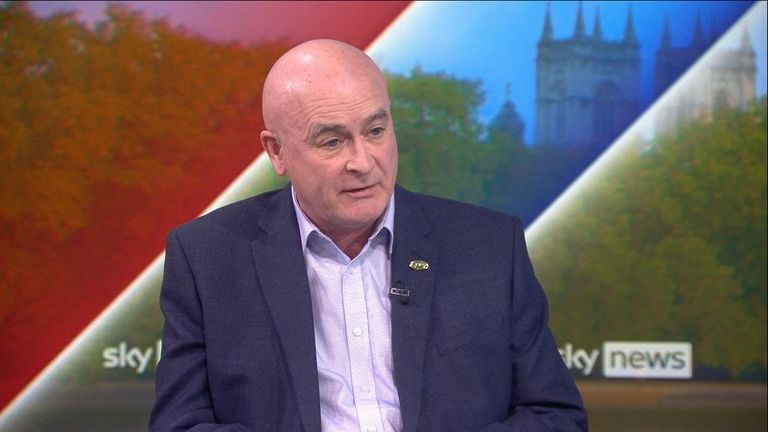Three dates revealed for ‘biggest national rail strike since 1989’
Railway workers planning to strike for three days later this month will “shut down the system”, according to the RMT union.
It said that up to 50,000 of its members across Network Rail, 13 train operators and on London Underground would walk out on 21 June in the “biggest outbreak of industrial action in the UK since 1989”.
An estimated 40,000 rail workers – excluding its Tube members – would strike on 23 and 25 June.
The strike dates follow ballots that ended last month.
There are three issues at the heart of the dispute for the union: pay, compulsory redundancies and safety concerns.
The row stems from government demands for savings on a network that was propped up by the taxpayer when passenger numbers collapsed during the COVID crisis.
The pay issue is complicated by the multitude of rail operating companies involved but none, it would seem. have met union demands for a rise in line with inflation.
RMT general secretary Mick Lynch said: “Railway workers have been treated appallingly and despite our best efforts in negotiations, the rail industry with the support of the government has failed to take their concerns seriously.
“We have a cost-of-living crisis, and it is unacceptable for railway workers to either lose their jobs or face another year of a pay freeze when inflation is at 11.1% and rising.
“Our union will now embark on a sustained campaign of industrial action which will shut down the railway system.
“Rail companies are making at least £500m a year in profits, whilst fat cat rail bosses have been paid millions during the COVID-19 pandemic.
“This unfairness is fuelling our members anger and their determination to win a fair settlement.
“RMT is open to meaningful negotiations with rail bosses and ministers, but they will need to come up with new proposals to prevent months of disruption on our railways.”
The government had said last month that contingency plans were being put in place to mitigate the impact of any strikes but freight services – to maintain the flow of goods – would have to be prioritised over passenger services.
There is also, clearly, bad blood between the transport secretary Grant Shapps and the union movement.
Comments in a Sunday Telegraph interview, in which Mr Shapps said the government was looking at drawing up laws that would ensure minimum service levels during industrial action, have raised union hackles.
The looming industrial action will be seen as a major test of Boris Johnson’s administration as it seeks to concentrate on the issues facing the country, such as tackling the cost of living crisis, in the wake of the slender victory for the PM in Monday’s confidence vote among Conservative MPs.
Disruption caused by the London Underground dispute has also coincided with trouble for air passengers as airports and airlines grapple staff shortages that have forced the cancellation of flights for several months and severe delays too – most recently over the half-term holidays.
Mr Shapps said of the planned strikes: “It is incredibly disappointing the RMT have decided to take action that could drive passengers away from the rail network for good.
“The pandemic has changed travel habits – with 25% fewer ticket sales and the taxpayer stepping in to keep the railways running at a cost of £16bn, equivalent to £600 per household. We must act now to put the industry on a sustainable footing.
“We are working with industry to reduce disruption caused by strike action, but Unions are jumping the gun by announcing this when talks have only just begun.
“We once again want to urge the unions to come to talks with the rail industry so we can work together to build a better, more modern, passenger-focussed, railway.”
Chairman of the Rail Delivery Group, Steve Montgomery, admitted that “significant disruption will be inevitable” should the action take place while Network Rail’s chief executive, Andrew Haines, held out hope that a deal could be agreed to avert the strikes.
“We continue to meet with our trades unions to discuss their pay concerns and we’re doing everything we can to avoid strike action on the railway”, he said in a statement.
“We know that the cost of living has increased and we want to give our people a pay rise, but the RMT must recognise we are a public body and any pay increase has to be affordable for taxpayers.
“Travel habits have changed forever and the railway must change as well. We cannot expect to take more than our fair share of public funds, and so we must modernise our industry to put it on a sound financial footing for the future. Failure to modernise will only lead to industry decline and more job losses in the long run.”



